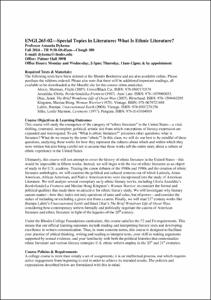Please use this identifier to cite or link to this item:
http://hdl.handle.net/10267/24339Full metadata record
| DC Field | Value | Language |
|---|---|---|
| dc.contributor.author | Dykema, Amanda | - |
| dc.date.accessioned | 2014-09-19T20:39:53Z | - |
| dc.date.available | 2014-09-19T20:39:53Z | - |
| dc.date.issued | 2014-08-27 | - |
| dc.identifier.uri | http://hdl.handle.net/10267/24339 | - |
| dc.description | This syllabus was submitted to the Office of Academic by the course instructor. Uploaded by Lorie Yearwood. | en_US |
| dc.description.abstract | This course will study the emergence of the category of “ethnic literature” in the United States—a vital, shifting, contested, incomplete, political, artistic site from which conceptions of literary expression are expanded and interrogated. To ask “What is ethnic literature?” presumes other questions: what is literature? What do we mean by the term “ethnic”? In this class, we will do our best to be mindful of these questions, analyzing these works for how they represent the cultures about which and within which they were written but also being careful not to assume that these works tell the entire story about a culture or ethnic experience in the United States. Ultimately, this course will not attempt to cover the history of ethnic literature in the United States – this would be impossible in fifteen weeks. Instead, we will begin with the rise of ethnic literature as an object of study in the U.S. academy. Tracing the canon debates of the 1980s and 1990s and the creation of ethnic literature anthologies, we will examine the political and cultural contexts out of which Latino/a, Asian American, African American, and Native American texts were incorporated into the study of American Literature. We will analyze several exemplary early ethnic literary works, including Gloria Anzaldúa’s Borderlands/La Frontera and Maxine Hong Kingston’s Woman Warrior, to consider the formal and political qualities that made them so attractive for ethnic literary study. We will investigate why literary canons matter—how they index not only questions of taste and value, but of power—and consider the stakes of including or excluding a given text from a canon. Finally, we will read 21st century works like Jhumpa Lahiri’s Unaccustomed Earth and Junot Díaz’s The Brief Wondrous Life of Oscar Wao, considering how contemporary writers formally and politically negotiate the canons of American literature and ethnic literature in light of the legacies of the 20th century. | en_US |
| dc.language.iso | en_US | en_US |
| dc.publisher | Memphis, Tenn. : Rhodes College | en_US |
| dc.relation.ispartofseries | Syllabi CRN 15277; | - |
| dc.rights | Rhodes College owns the rights to the archival digital images in this collection. Objects are made available for educational use only and may not be used for any non-educational or commercial purpose. Approved educational uses include private research and scholarship, teaching, and student projects. Original copies of the programs are stored in the Rhodes College Archives. In all instances of use, acknowledgement must be given to Rhodes College Archives Digital Repository, Memphis, TN. For information regarding permission to use this image, please email the Archives at archives@rhodes.edu | - |
| dc.subject | English, Department of | en_US |
| dc.subject | Syllabus | en_US |
| dc.subject | Curriculum | en_US |
| dc.subject | 2014 Fall | en_US |
| dc.subject | Student research | en_US |
| dc.title | ENGL 265-02, Special Topics: What is Ethnic Literature?, Fall 2014 | en_US |
| dc.type | Syllabus | en_US |
| Appears in Collections: | Course Syllabi | |
Files in This Item:
| File | Description | Size | Format | |
|---|---|---|---|---|
| 2014_FALL_ENGL_265_02_15277.pdf | 40.02 kB | Adobe PDF |  View/Open |
Items in DSpace are protected by copyright, with all rights reserved, unless otherwise indicated.